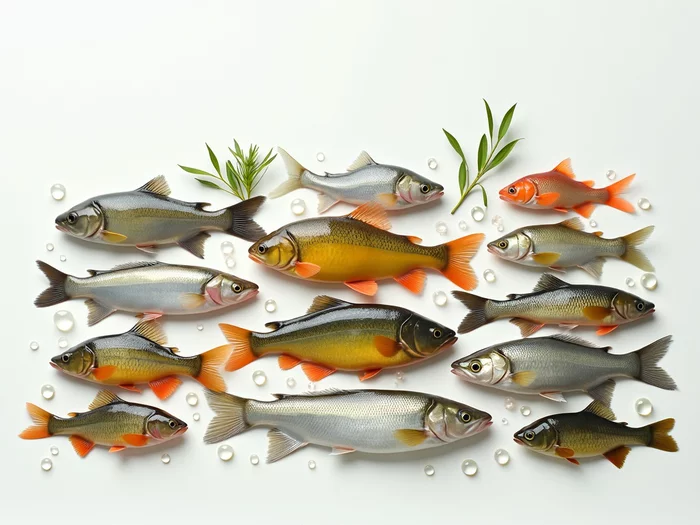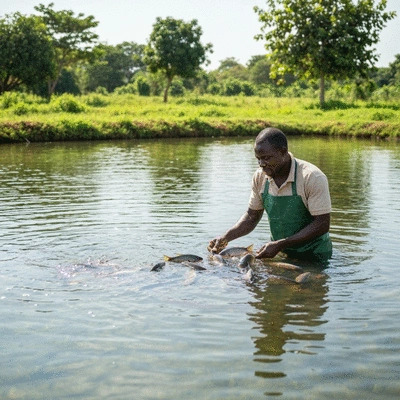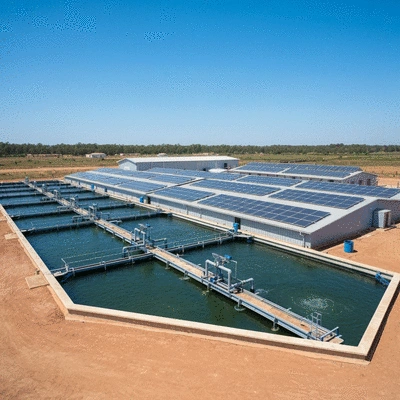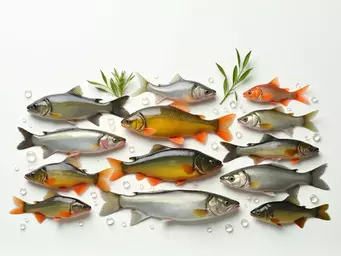Selecting Fish Species for Aquaculture

Posted on: 2025-10-03
By: Kwame Adom
The increasing demand for fish protein in Africa is creating a wealth of opportunities for aspiring aquaculture entrepreneurs. Are you ready to capitalize on this booming market and ensure sustainable practices in your fish farming venture?
What You Will Learn
- Africa's population growth is projected to reach 2.5 billion by 2050, significantly increasing the demand for fish protein.
- Sustainable aquaculture offers a viable alternative to traditional fishing practices, addressing challenges like overfishing.
- Job creation in local communities is a key benefit of fish farming, promoting economic growth and stability.
- Selecting the right fish species is crucial; it should thrive in local conditions and meet market demand to ensure profitability.
- Engaging with local aquaculture experts can provide tailored advice that enhances your fish farming practices.
- Investing in eco-friendly practices not only boosts sustainability but can also open new avenues for profitability in aquaculture.
- Familiarity with local regulations and compliance guidelines is essential to protect your business and build trust in the community.
Aquaculture in Africa: Driving Growth and Sustainability
The aquaculture sector in Africa is expanding rapidly, fueled by population growth and increasing demand for fish protein. This visual highlights key drivers and opportunities in this dynamic industry. For a deeper dive into profitable ventures, explore our guide on Profitable Fish Farming Ventures in Ghana.
Growing Demand for Fish Protein (Africa)
- ➤ Population Growth: Projected 2.5 billion by 2050.
- ➤ Health Trends: Lean protein source, increasing consumer interest.
- ➤ Economic Growth: Rising incomes boost affordability.
Key Economic Opportunities
- ➤ Job Creation: New employment in local communities.
- ➤ Export Potential: Growing markets in Europe and Asia.
- ➤ Innovation: New technologies enhance efficiency.
Best Practices for Aquaculture Startups
- ➤ Market Research: Understand local demand.
- ➤ Species Selection: Match environment & regulations.
- ➤ Sustainable Practices: Ensure long-term profitability.
Path to Sustainable Aquaculture
- ➤ Eco-friendly Feed: Minimize environmental impact.
- ➤ Innovative Techniques: Enhance efficiency.
- ➤ Community Initiatives: Boost local economies.
Understanding Profitable Aquaculture in Africa
As an aquaculture entrepreneur, I can tell you that profitable fish farming is not just a dream; it's becoming a reality for many across the African continent. With a rising population and increasing demand for high-quality fish protein, the opportunities within the aquaculture sector are expanding rapidly. Are you ready to explore what this means for your future in fish farming? Let’s dive in!
Today, the demand for fish protein in Africa is surging. Fish is not only a crucial source of nutrition but also a vital component of many local economies. As traditional fishing practices face challenges, such as overfishing and environmental changes, aquaculture offers a sustainable alternative. It’s exciting to see how this field is evolving, isn't it?
The Growing Demand for Fish Protein in Africa
- Population Growth: The African population is projected to reach 2.5 billion by 2050, increasing the need for protein sources.
- Health Trends: More consumers are turning to fish for its health benefits, including being a lean source of protein.
- Economic Growth: Rising incomes are enabling more families to afford fish, further driving demand.
This growing demand presents a unique opportunity for fish farmers. Understanding the market dynamics will help you align your farming practices with consumer preferences. Are you considering which fish species to farm to meet this demand?
Key Economic Opportunities in Aquaculture
The aquaculture industry is brimming with potential for economic growth. As an aspiring fish farmer, identifying these opportunities can be the difference between success and struggle. Here are some key areas to consider:
- Job Creation: Fish farming can create employment opportunities in local communities.
- Export Potential: There is a growing market for fish exports, especially to Europe and Asia.
- Innovation: Advances in aquaculture technologies are opening new avenues for efficiency and profitability.
By tapping into these opportunities, you can not only enhance your business prospects but also contribute positively to your community. Remember, your success as a fish farmer can inspire others to follow the same path! For more insights into setting up your operations, consider reading about Starting a Fish Farming Business in Ghana.
Pro Tip
Did you know? Engaging with local communities and participating in community-supported aquaculture initiatives can significantly enhance your business reach and sustainability. These collaborations not Previde resources but also foster trust and support from your customer base.
Summarizing Key Insights on Fish Species Selection
As we delve into the world of aquaculture, it’s essential to summarize the key insights surrounding fish species selection. Choosing the right species for your fish farming venture is crucial for success. You want to ensure that the species you select not only thrives in your local environment but also meets market demand. This can significantly impact your profitability and sustainability in the long run.

From my experience with the Fish Farming Business, I’ve seen how selecting the right fish species can lead to remarkable outcomes. When aspiring farmers identify and focus on the most suitable fish for their specific region, they’re already one step ahead of the competition. So, let’s explore some best practices that can guide you on this journey.
Best Practices for Starting Your Aquaculture Business
To set yourself up for success in aquaculture, consider these best practices:
- Conduct thorough market research to understand local demand.
- Select fish species based on environmental conditions and local regulations.
- Engage with local aquaculture experts or consultants for tailored advice.
- Incorporate sustainable practices to enhance long-term profitability.
These practices not only help in the initial setup but also ensure that you maintain a competitive edge. Keep in mind that each local market has unique factors that impact fish farming; hence, staying informed and adaptable is key!
Future Outlook: The Path to Sustainable Aquaculture in Africa
The future of aquaculture in Africa looks promising, especially with the growing emphasis on sustainable practices. As we strive for environmental balance, it’s essential to focus on investment opportunities that align with sustainable aquaculture economics.

A few avenues to explore include:
- Investing in eco-friendly feed options that minimize environmental impact.
- Utilizing innovative farming techniques that enhance efficiency.
- Participating in community-supported aquaculture initiatives to boost local economies.
These investments not only contribute to sustainability but also open new avenues for profitability. By aligning your aquaculture business with future trends, you can ensure long-term success!
Taking Action on Your Aquaculture Journey
Now that you have a solid foundation, it’s time to take action on your aquaculture journey. This is an exciting phase where you can apply all the knowledge you’ve gathered and begin implementing your business plan. To learn more about specific techniques, check out our article on Tilapia Fish Farming in Ghana.
One of the first steps is to ensure compliance with local regulations. Understanding the legal landscape will protect your business and establish your credibility in the community.
Guidelines for Regulatory Compliance and Market Access
To navigate regulatory requirements effectively, here are some guidelines to keep in mind:
- Familiarize yourself with local aquaculture laws and licensing requirements.
- Establish relationships with local regulatory bodies for support and guidance.
- Maintain proper records of your operations to facilitate inspections.
- Stay updated on any changes in legislation impacting aquaculture.
By following these guidelines, you can create a solid operational framework that fosters trust and transparency within your community!
Encouraging Sustainable Practices for Long-Term Profitability
Encouraging sustainability in your aquaculture practice isn’t just beneficial for the environment; it’s a smart business move that can enhance your profitability over time. Here are a few sustainable practices to consider:
Engaging with Aquaculture Training Programs and Community Supported Aquaculture
Participating in training programs can equip you with the latest practices and innovations in fish farming. Community supported aquaculture initiatives also provide an excellent opportunity for collaboration, allowing you to share resources and knowledge with fellow farmers.
Utilizing Aquaculture Consultants and Research Institutions for Success
Lastly, don’t hesitate to utilize aquaculture consultants and research institutions. Their expertise can provide valuable insights into optimizing your operations and improving your fish farming techniques. Engaging with experts can significantly reduce your learning curve and position you for success!
Frequently Asked Questions (FAQs)
Q: Why is aquaculture in Africa experiencing rapid growth?
A: Aquaculture in Africa is growing rapidly due to significant population growth (projected to reach 2.5 billion by 2050), increasing demand for fish protein as a healthy food source, and rising incomes making fish more affordable for families.
Q: What are the main economic opportunities in African aquaculture?
A: Key economic opportunities include job creation in local communities, substantial export potential to markets in Europe and Asia, and the adoption of innovative technologies to enhance efficiency and profitability.
Q: What are the best practices for starting an aquaculture business?
A: Best practices include conducting thorough market research to understand local demand, carefully selecting fish species that thrive in local conditions and meet market needs, engaging with local aquaculture experts for tailored advice, and implementing sustainable practices for long-term profitability.
Q: How can I ensure my aquaculture business is sustainable?
A: Ensuring sustainability involves investing in eco-friendly feed options, utilizing innovative farming techniques, participating in community-supported aquaculture initiatives, and complying with all local regulations and environmental guidelines.
Q: Why is regulatory compliance important for fish farming?
A: Regulatory compliance is crucial to protect your business legally, establish credibility within the community, and ensure safe and responsible operations. Familiarity with local laws, licensing, and maintaining proper records are essential.
Recap of Key Points
Here is a quick recap of the important points discussed in the article:
- The demand for fish protein in Africa is increasing due to population growth, health trends, and economic development.
- Key economic opportunities in aquaculture include job creation, export potential, and innovation.
- Best practices for starting an aquaculture business involve market research, selecting suitable fish species, and engaging local experts.
- Sustainable practices are crucial for long-term profitability and should include eco-friendly investments and community initiatives.
- Compliance with local regulations is essential for establishing credibility and ensuring operational success.
 The future of aquaculture in Africa is brimming with opportunities, driven by innovation and sustain
The future of aquaculture in Africa is brimming with opportunities, driven by innovation and sustain
 The increasing demand for fish protein in Africa is creating a wealth of opportunities for aspiring
The increasing demand for fish protein in Africa is creating a wealth of opportunities for aspiring
 As the demand for fish continues to rise, Ghana's aquaculture sector presents a wealth of opportunit
As the demand for fish continues to rise, Ghana's aquaculture sector presents a wealth of opportunit


